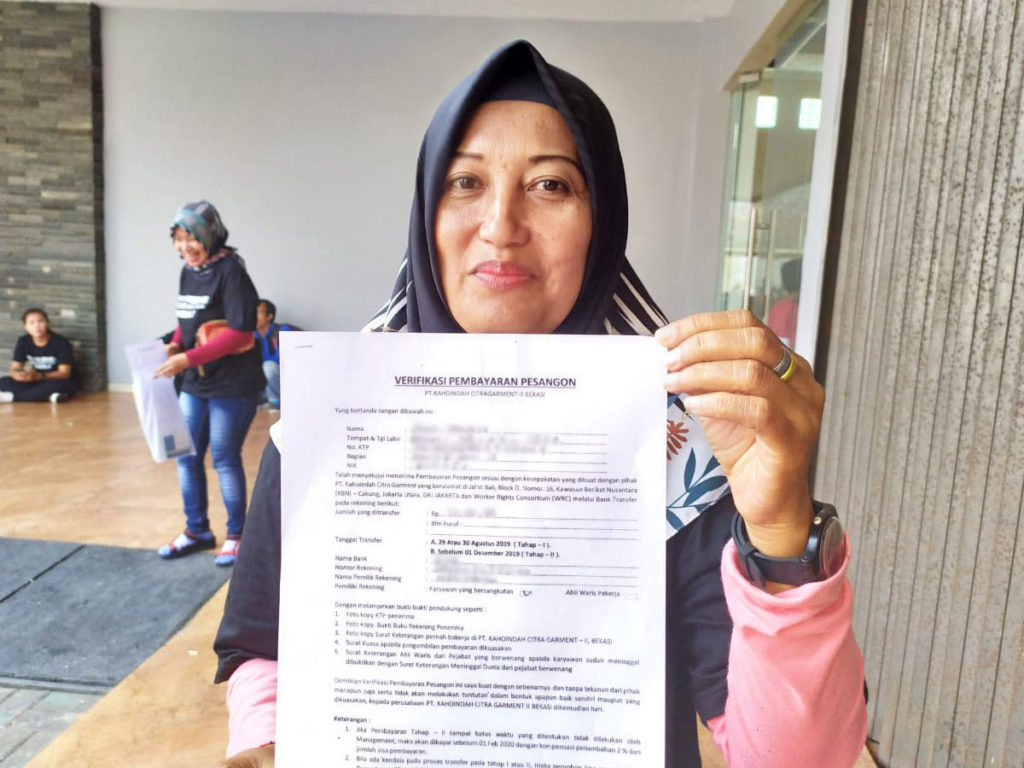In the fall of 2019, two thousand Indonesian workers received what the WRC believes to be the largest amount workers have won in a single case of illegally denied severance.
On July 2, 2018, the management of PT Kahoindah Citragarment (Kahoindah), an Indonesian garment factory owned by the Korean firm Hojeon LLC, had announced that the factory would be closing. The company reported that this decision was taken in response to Nike’s decision to end its sourcing relationship with Kahoindah. The factory, which at the time of the announcement employed 2,001 workers, produced collegiate apparel for Nike and non-collegiate apparel for Fanatics.
Following this announcement, according to the WRC’s findings, management engaged in a campaign of consistent and targeted harassment to coerce workers to resign from the factory before the closure, which greatly reduced the amount they owed to workers in severance.
Indonesian law makes significant provisions for severance and other terminal benefits. In instances in which a factory closes but the company remains in business, as was the case at Kahoindah, workers are entitled to double the minimum legally mandated severance amount. Due to this high severance burden, many factory owners employ illegal means to deny former employees the severance benefits that they are entitled to. This includes unlawfully coercing workers to resign from a factory in advance of a closure, which effectively halves the amount paid to these workers.
WRC Findings: Intimidation, Threats, Wage Theft
In response to a complaint, the WRC undertook an investigation of PT Kahoindah Citragarment, which included interviews with 71 former workers. The investigation corroborated worker allegations that management had coerced a significant portion of the factory’s workforce to resign in advance of the factory’s closure to reduce the amount of severance owed to each worker. Workers reported to the WRC that they were intimidated and harassed, including being told by supervisors that, “If you don’t submit [your resignation], you will get nothing!” Some workers faced retaliatory transfers to less desirable positions within the factory if they refused to heed management’s demand to resign.
A supervisor corroborated workers’ accounts, telling the WRC his superiors gave him “instructions on how we could get workers to resign,” including lying to the workers he supervised. When the supervisor refused to lie to the workers, the production manager eventually threatened to transfer him to the boiler section, a job assignment that, he said, is well known to be dangerous. Our investigation revealed a pattern of harassment, consistent with the above examples, which resulted in nearly all of the workers resigning in advance of the factory closure. This violated Indonesian law, which states that all resignations must be voluntary.
The efforts of the factory management were highly successful, convincing the majority of the factory’s workforce to resign before the closure, which took place on October 12, 2018. These resignations saved the company approximately US$4.5 million.
Engagement and Resolution: $4.5 Million for Workers
After concluding our investigation, the WRC approached Hojeon and key brands sourcing from Hojeon’s Indonesian factories. After Fanatics, Gap, and Under Armour communicated clearly to Hojeon that they expected the firm to make workers whole, Hojeon reached an agreement with the WRC.
Hojeon agreed to pay the 2,001 affected workers an additional US$4.5 million to make them whole. These payments were made in two tranches, in August and November 2019. On average, workers received the equivalent of seven months’ pay. This money represented a critical resource for the workers at the factory after losing their jobs. One worker stated that she planned, “to save [the severance] to pay for [her] children’s education.” Another worker, who is responsible for providing for both her children and her sick parents, said that she would use the money to, “open [her] own business, a small restaurant,” to have a new income source for the family.

Illegally Denied Severance: Successes and Ongoing Challenges
As noted, severance is a vital resource for garment workers who lose their jobs, as it is often the primary form of support they rely on as they search for new work or use as seed money for a new business that can provide their family with a stable source of income. However, factory owners in most major garment exporting countries frequently illegally deny workers access to these terminal benefits. Downward price pressure, which makes it difficult for many factory owners to set aside funds for severance, is a key driver of this malfeasance.
Despite this grim reality, this case demonstrates the power of the WRC’s enforcement of university codes of conduct over the course of the past decade and sets an important precedent. As one union leader noted, “this payment not only means a great deal to the 2,000 workers affected by this closure but is also a signal to other brands and employers that it is time for this wage theft to end.” Through continued vigilance on the part of the WRC, universities, students, workers, and other advocates, more and more brands have come to understand that they must require their suppliers to pay all severance legally owed to workers.
In 2019 alone, the WRC has assisted our allies in recovering US$7.88 million in unpaid severance. We will continue to work toward systemic solutions of this too-often unacknowledged form of pay theft.
